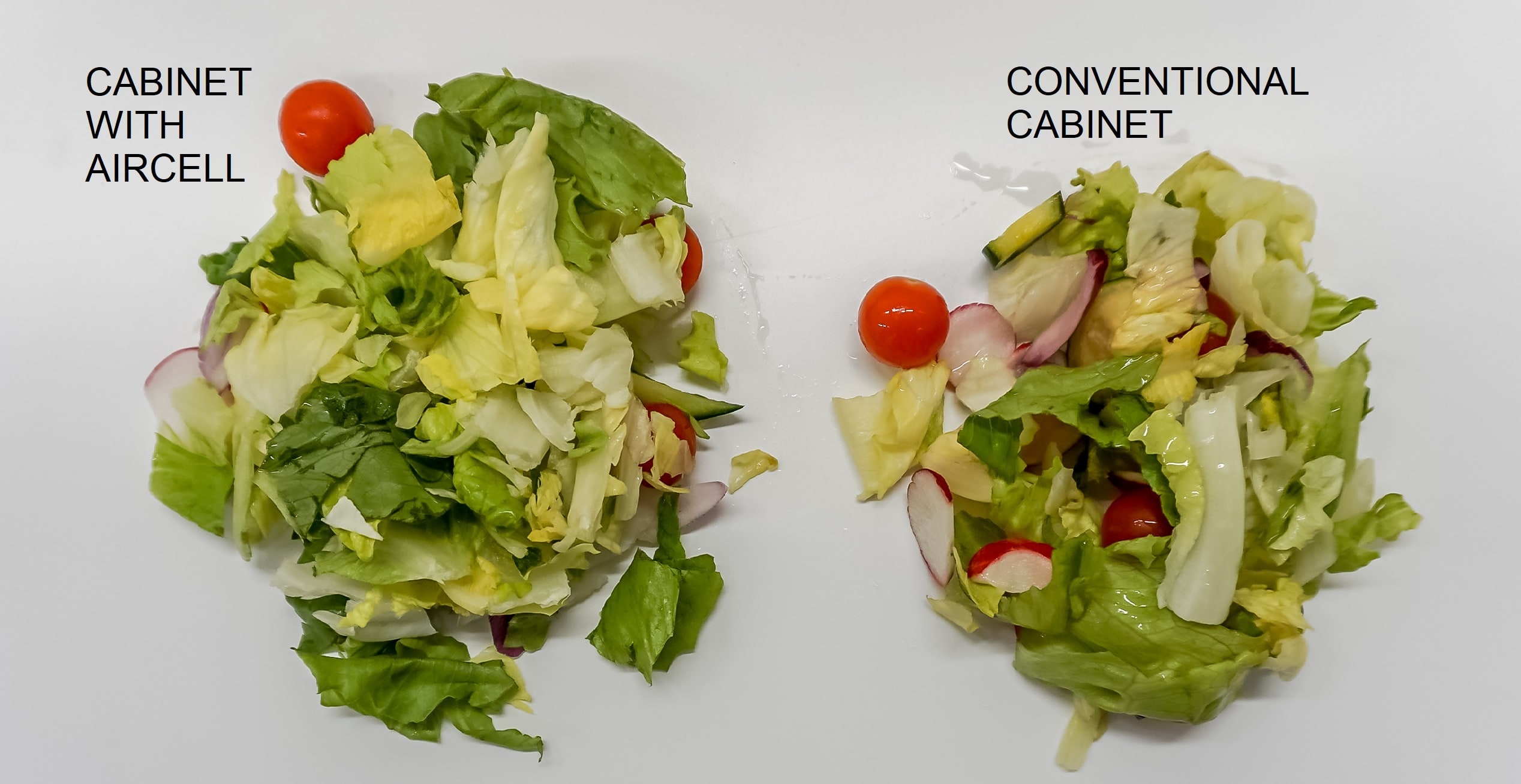
In food technology, it is an established fact that perishables held within a narrow and stable temperature bandwidth and at higher relative humidity will be maintained at better quality for longer, leading to an extended shelf life and a more enjoyable product for the customer. To help quantify the importance of stable holding temperature bandwidths and higher relative humidity, Applied Design & Engineering commissioned Assured Quality Solutions Ltd to assist in scientific trials.
Over a seven day period, bags of baby leaf salad and house salad bowls, provided by a major industry supplier, were held in a commercially available open front multi deck and an identical model, modified with the patented Aircell® air flow management system. Salad was selected for the tests due to its sensitivity to temperature abuse and its relatively short shelf life, typically six days. During the trials, the conventional single air curtain cabinet demonstrated a temperature bandwidth of 11.2ºC compared with a span of 5.4ºC in the model Aircell®. Relative humidity was measured at 9% higher in the cabinet with Aircell®.
Substantial differences
Salad bags and bowls were taken from the cabinets at the end of each day of the trials and transported, in a refrigerated container, to a local independent microbiology laboratory for measurement of yeasts, moulds and total viable counts (TVC) for bacterial growth. On each day of the tests, the TVC were consistently higher in the baby leaf salad bags displayed in the conventional cabinet. The highest TVC in the cabinet with Aircell® was 5.0 x 107 colony forming units per gram (cfu/g) compared with 2.8 x 108 cfu/g in the conventional cabinet. By day five there was also a substantial difference in the total yeast count of 1.6 x 104 cfu/g in the cabinet with Aircell®, compared with 3.0 x 105 cfu/g in the conventional cabinet, indicating that bacterial proliferation occurred sooner and was greater in the conventional cabinet.
Similarly, the TVC for bacterial growth in the house salad bowls were consistently higher in the conventional cabinet. By day five the total yeast on the salad displayed in the conventional cabinet was 2.8 x 105 cfu/g compared with 4.0 x 103 cfu/g cabinet with Aircell®, demonstrating more rapid bacterial proliferation in the conventional cabinet.
In addition to the laboratory assessments, David Vagg of Assured Quality Solutions Ltd conducted organoleptic (taste, sight, smell and touch) tests and found that there was a higher degree of product degradation in the salad packs and bowls displayed in the conventional cabinet. The majority of the baby leaf salad displayed in the conventional cabinet scored below 25% in the sensory assessment, compared with a much better score of above 60% in the cabinet with Aircell®. The overall sensory quality score of house salad bowls was rated at 68% in the cabinet with Aircell® and 44% in the conventional cabinet.
Opportunities for retailers
At the end of the trials, David Vagg commented: “The tighter temperature control demonstrated by the cabinet with Aircell® offers up a number of opportunities for the retailer. There is real potential for longer shelf life and fewer customer complaints associated with poor quality, deteriorating products. The current focus on limiting single use plastic packaging is likely to shorten shelf life and increase food waste. Aircell®, with its tighter temperature bandwidth, has the potential to mitigate the impact of reduced packaging on product quality.”
Applied Design & Engineering’s chairman, Nigel Bell, added: “Aircell® is a unique and disruptive technology for open front refrigerated displays. It is currently the only system which helps ensure consistently narrower temperature bandwidths for maintaining perishable merchandise at optimum quality over extended periods. We believe these trials demonstrate that refrigerated cabinets incorporating Aircell® will help make a tangible contribution to reducing food waste in the retail cold chain.”
Pictured: Salad sample comparison at use by date. Salad from the conventional cabinet shows marked deterioration compared with salad from the cabinet with Aircell®.




